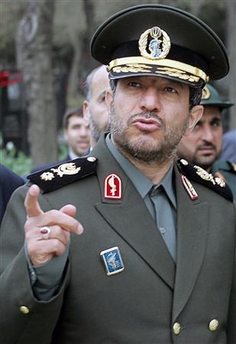Iran scoffed at the idea of U.S. military action to halt its nuclear program
and gave no hint of compromise on Thursday before a visit by U.N. inspectors to
assess Iranian compliance with Security Council demands.

Iranian Defence
Minister Mostafa Mohammad Najjar is seen in Baku, Azerbaijan, April 20,
2006. The prospect of the United States using force to halt Iran's nuclear
program is empty talk, Najjar said on Thursday.
[Reuters] |
The International Atomic Energy Agency will report to the top world body on
April 28 on whether Tehran has halted uranium enrichment and answered IAEA
questions about its nuclear activities in line with a 30-day deadline set by the
council.
President Bush has vowed to stop Iran from getting atomic weapons and has
refused to rule out military options, including nuclear strikes, if diplomacy
fails.
"The United States has been threatening Iran for 27 years and this is not new
for us. Therefore we are never afraid of U.S. threats," Iranian Defense Minister
Mostafa Mohammad Najjar told reporters during a visit to neighboring Azerbaijan.
"If you take into account the fact that they are not doing anything, this
shows it is just talk," he said.
Najjar said Iran was ready to negotiate, but would deal with any challenge
confronting it.
Senior IAEA inspectors were due in Iran on Friday to gauge Iranian compliance
for the report that Mohamed ElBaradei, the U.N. watchdog's director, is
preparing for the Security Council.
Worries about the nuclear standoff have helped drive oil prices to record
highs, with Brent crude trading above $74 a barrel on Thursday after a steep
drop in U.S. gasoline stocks.
Iran, the world's fourth-biggest oil exporter, says it wants only
nuclear-generated electricity, not bombs.
But its declaration last week that it had successfully enriched uranium and
would now pursue large-scale production heightened international suspicions
about its intentions.
The United States, Britain and France want the Security Council to approve
targeted sanctions on Iran, such as travel bans and asset freezes, if it refuses
to back down.
But China and Russia, the council's other two veto-holders, doubt punitive
measures will work. Big-power talks in Moscow this week failed to produce a
consensus on future action.
European diplomats on Thursday dismissed as unacceptable a suggestion that
Iran take a brief "technical pause" from nuclear enrichment to revive collapsed
negotiations with the EU.
They told Reuters Mohamed ElBaradei, the director-general of the U.N.'s
International Atomic Energy Agency (IAEA), discussed this idea with Iranian
officials in Tehran last week.
"A full suspension is the only way to resolve this and the Iranians have
given no indication they are willing to do that," a senior EU diplomat told
Reuters.
U.S. Secretary of State Condoleezza Rice said on Wednesday the world was
mobilized to deny Iran nuclear weapons.
"We are prepared to use measures at our disposal -- political, economic,
others, to dissuade Iran," she said.
Russia, however, rejected a call from the United States, which has long
maintained its own trade embargo on Iran, to halt work on the Islamic Republic's
Bushehr nuclear power station.
Russia's state atomic energy agency is contracted to help Iran build the $1
billion reactor. A senior U.S. official said on Wednesday that a Russian
withdrawal would help persuade Iran to abandon its separate uranium enrichment
program.
"Every country has the right to decide for itself with whom and in what way
it cooperates with other states," Russian Foreign Ministry spokesman Mikhail
Kamynin said, adding that only the U.N. Security Council could override this
principle.
Speaking in Moscow, UnderSecretary of State Nicholas Burns had also repeated
Washington's view that Moscow should cancel the planned sale to Iran of Tor
tactical surface-to-air missiles. Moscow and Tehran say they are for defensive
purposes.
Kamynin's statement did not mention the missile sales.
Iranian nuclear negotiators were in Moscow on Thursday but there was no word
on what they were doing. They met officials of Britain, France and Germany late
on Wednesday, but a British diplomat said there had been no breakthrough.
Bush, meeting Chinese President Hu Jintao in Washington on Thursday, did not
appear to have persuaded him to allow tougher steps in the U.N. Security
Council. Hu repeated Beijing's calls for a solution through "diplomatic
negotiations."
In Seoul, a senior European Union official called on Iran to comply with IAEA
demands that it suspend all enrichment and reprocessing activities to allow a
return to negotiations.
"We remain committed to a diplomatic solution," EU Commissioner Benita
Ferrero-Waldner told a news conference.